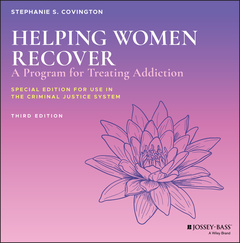Description
Helping Women Recover (3rd Ed., Special Edition for Use in the Criminal Justice System, 3e Set)
A Program for Treating Addiction
Author: Covington Stephanie S.
Language: English
Subject for Helping Women Recover:
1005 p. · 30.7x29.2 cm · Loose-leaf
Description
/li>Contents
/li>Biography
/li>
The latest, fully-revised and updated edition of classic and best-selling work in the field
Since it was first published in 1999, Helping Women Recover has set the standard for best practice in the field of women's treatment. Helping Women Recover is a manualized treatment intervention based on Dr. Covington's Women's Integrated Treatment (WIT) model?offering a program developed to meet the unique needs of women addicted to alcohol, other drugs, and those with co-occurring disorders. Included in SAMHSA's National Registry of Evidence-based Programs and Practices, The Helping Women Recover program offers counselors, mental health professionals, and program administrators the tools they need to implement a gender-responsive, trauma-informed treatment program in group settings or with individual women in criminal justice settings.
Now in its third edition, this binder set including both a facilitator's guide and a hands on participant's journal, has been updated with new material on opioid addictions, how to become trauma-informed and gender-responsive, LGBTQ issues, and more. Updated references, further reading suggestions, and a chapter for facilitators which includes the challenges of working in the criminal justice system help practitioners to effectively implement the program in daily practice. A vital tool for all mental health and addiction treatment professionals, Helping Women Recover:
- Draws from the most up-to-date theory and practical applications in the fields of addiction and trauma
- Covers the historical background and fundamental principles of gender-responsive services
- Provides guidance for facilitating an effective woman's treatment program
- Offers real-world insights on the role of the facilitator
- Includes an appendix of additional recovery resources such as The Sixteen Steps for Discovery & Empowerment and Women for Sobriety New Life Program Acceptance Statements
Helping Women Recover is essential for mental health and addiction treatment professionals including counselors, therapists, social workers, psychologists, and psychiatrists who work with women in HWR is essential for anyone providing services to women in criminal justice settings.
About the Author xiii
Books and Programs xiv
About the Cover xv
Acknowledgments xvii
1 Introduction to Addiction Treatment for Women 1
Women in the Criminal Justice System: Who They Are 2
Historical Background: Why a Woman’s Treatment Program? 8
What We Have Learned 12
Fundamentals of Gender-Responsive Services 22
Integration 55
The Value of Twelve Step Programs and Other Mutual-Help Groups 56
Research on Helping Women Recover 58
2 Facilitating the Program 65
Organization and Content of the Program 66
Using this Facilitator’s Guide 67
Principles of an Effective Treatment Program 74
Materials Needed for the Sessions 93
Opening Session: Introduction to the Program 103
Optional Yoga Exercise: Seated Centering and Breathing 139
Module A: Self 145
Session 2. Defining Self 149
Session 3. Sense of Self 183
Session 4. Self-Esteem 203
Session 5. Sexism, Stereotyping, and Power 221
Yoga Exercise: Breath of Joy to Rag Doll to Lip Flutter 174, 196, 214, 247
Module B: Relationships 255
Session 6. Family of Origin 259
Session 7. Mothers 301
Session 8. Mother Myths 319
Session 9. Fathers 341
Session 10. Understanding Abuse and Trauma 365
Session 11. Interpersonal Violence 401
Session 12. Creating Supportive and Loving Relationships 433
Yoga Exercise: Feminine Warrior Sequence 292, 311, 333, 357, 394, 426, 463
Module C: Sexuality 471
Session 13. Sexuality and Addiction 479
Session 14. Body Image 511
Session 15. Gender Identity and Sexual Orientation 541
Session 16. Challenges to Healthy Sexuality 569
Session 17. Healthy Sexuality 597
Yoga Exercise: Essential Oil Embrace into Awesome Arms/Goddess Pose 504, 534, 561, 589, 618
Module D: Spirituality 625
Session 18. What Is Spirituality? 629
Session 19. Mindfulness, Prayer, and Meditation 655
Session 20. Creating a Vision 675
Yoga Exercise: Blessing Body, Mind and Spirit 647, 667
Appendix 1. Five Senses Cards 693
Appendix 2. Local Resources forWomen 695
Appendix 3. Additional Recovery Resources 697
Appendix 4. Redefining Gender 703
Appendix 5. Words of Wisdom 707
References 715
Feedback Form 737
Index 739
Stephanie S. Covington, PhD, LCSW, is an internationally recognized clinician, author, lecturer, and organizational consultant and is a pioneer in the field of women's issues, addiction, trauma, and recovery. With over thirty-five years of experience, she is noted for her work in the design and implementation of gender-responsive and trauma-informed treatment services in public, private, and institutional settings. She is the author of numerous books, as well as ten research-based, manualized treatment curricula, including Beyond Trauma: A Healing Journey for Women, Helping Women Recover: A Program for Treating Addiction, and Voices: A Program for Girls. She is the co-author of Helping Men Recover. For the past twenty-five years, Dr. Covington has worked to help institutions and programs in the criminal justice system develop effective gender-responsive services. She has provided training and consulting services to the United Nations Office on Drugs and Crime; the Ministries of Justice in England, Scotland, and Switzerland; the Correctional Service of Canada; and, in the U.S., the Federal Bureau of Prisons, the National Institute of Corrections, the Center for Substance Abuse Treatment, the California Department of Corrections and Rehabilitation, and many other state and local jurisdictions. In addition, she helped to design women's services at the Betty Ford Treatment Center and was the featured therapist on the Oprah Winfrey Network (OWN) TV show entitled Breaking Down the Bars. Dr. Covington has served on the faculties of the University of Southern California, San Diego State University, and the California School of Professional Psychology. She is co-director of the Institute for Relational Development and the Center for Gender & Justice in La Jolla, California.




